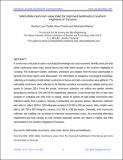| dc.description.abstract | A survey was conducted to assess mycological knowledge and socio-economic benefits along the wild
edible mushrooms value chain among Benna and Hehe ethnic groups in the Southern Highlands of
Tanzania. The mushroom hunters, collectors, processors and retailers from the local communities in
Njombe and Iringa regions were interviewed. The information on indigenous mycological knowledge,
collecting and retailing of wild edible mushrooms in Benna and Hehe communities were gathered. The
wild edible mushrooms were collected in the Miombo woodland surrounding six villages during rainy
season in January 2014. From the survey, mushroom collection and selling was gender oriented
dominated by women at 70% and 93.5% respectively. Moreover, it was found that 30% of men were
involved in collecting and only 6.5% in selling. About 45 species of wild edible mushrooms were
collected mainly from Lactarius, Russula, Cantharellus and Amanita species. Mushroom collectors
were able to collect 1000 to 1500 kilograms earning US $ 500 to 650 per season. Also, retailers were
able to sell 750 to 800 kilograms, earning US $ 750 to 1000 per season. Generally, wild mushrooms
collection and retailing can contribute to improved socioeconomic status, thus providing alternative
employment and food security to rural minority especially women and elderly in Benna and Hehe
communities in the Southern Highlands of Tanzania. | en_US |

